62% believe artificial intelligence will have a major impact on jobholders overall in the next 20 years, but far fewer think it will greatly affect them personally. People are generally wary and uncertain of AI being used in hiring and assessing workers
Pew Research Center conducted this study to understand Americans’ views of artificial intelligence and its uses in workplace hiring and monitoring. For this analysis, we surveyed 11,004 U.S. adults from Dec. 12 to 18, 2022.
Everyone who took part in the survey is a member of the Center’s American Trends Panel (ATP), an online survey panel that is recruited through national, random sampling of residential addresses. This way, nearly all U.S. adults have a chance of selection. The survey is weighted to be representative of the U.S. adult population by gender, race, ethnicity, partisan affiliation, education and other categories. Read more about the ATP’s methodology.
Here are the questions used for this report, along with responses, and its methodology.
The rapid rise of ChatGPT and other artificial intelligence (AI) systems has prompted widespread debates about the effectiveness of these computer programs and how people would react to them. At times, Americans are watching the general spread of AI with a range of concerns, especially when the use of AI systems raises the prospect of discrimination and bias.
One major arena where AI systems have been widely implemented is workplace operations. Some officials estimate that many employers use AI in some form of their hiring and workplace decision-making.
A new Pew Research Center survey finds crosscurrents in the public’s opinions as they look at the possible uses of AI in workplaces. Americans are wary and sometimes worried. For instance, they oppose AI use in making final hiring decisions by a 71%-7% margin, and a majority also opposes AI analysis being used in making firing decisions. Pluralities oppose AI use in reviewing job applications and in determining whether a worker should be promoted. Beyond that, majorities do not support the idea of AI systems being used to track workers’ movements while they are at work or keeping track of when office workers are at their desks.
Yet there are instances where people think AI in workplaces would do better than humans. For example, 47% think AI would do better than humans at evaluating all job applicants in the same way, while a much smaller share – 15% – believe AI would be worse than humans in doing that. And among those who believe that bias along racial and ethnic lines is a problem in performance evaluations generally, more believe that greater use of AI by employers would make things better rather than worse in the hiring and worker-evaluation process.
Overall, larger shares of Americans than not believe AI use in workplaces will significantly affect workers in general, but far fewer believe the use of AI in those places will have a major impact on them personally. Some 62% think the use of AI in the workplace will have a major impact on workers generally over the next 20 years. On the other hand, just 28% believe the use of AI will have a major impact on them personally, while roughly half believe there will be no impact on them or that the impact will be minor.
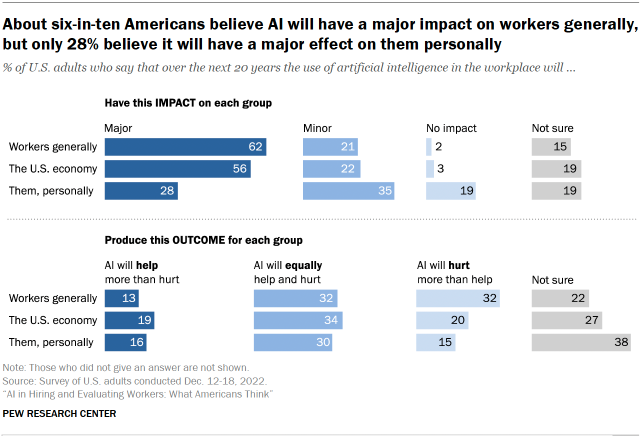
Asked about potentially beneficial or harmful effects of AI in workplaces in the next 20 years, a higher share say it will hurt more than help workers than say the inverse. About a third of Americans (32%) think the benefits and harms will be equally split for workers generally, while 22% are not sure about its potential effect.
At the personal level, 38% of Americans say they are not sure what the outcome of AI use in workplaces will be for them personally. Three-in-ten say the use of AI in these places will even out – the help and the hurt will be equal. Some 16% of adults think they themselves will be more helped than hurt, and 15% believe they themselves will be more hurt than helped.
When it comes to Americans’ opinions about the impact of AI use in the workplace on the overall U.S. economy, 56% think over the next 20 years the impact will major, while 22% believe it will be minor. A small fraction (3%) say there will be no impact and 19% are not sure. (For details by demographic groups on these questions, please see Appendix A.)
These broad results come from a Center survey of 11,004 U.S. adults conducted Dec. 12-18, 2022. These findings set an overarching framework for more contextual findings related to three specific work-related activities that are explored more fully in the poll: hiring processes, worker monitoring and evaluation efforts, and the use of face recognition in workplaces.
Other survey reports and blog posts on artificial intelligence and society
This is part of a series of publications that looks at the increasing role of AI in shaping American life. For more, read:
- 60% of Americans Would Be Uncomfortable With Provider Relying on AI in Their Own Health Care
- How Americans view emerging uses of artificial intelligence, including programs to generate text or art
- Public Awareness of Artificial Intelligence in Everyday Activities
- Older Americans more wary than younger adults about prospect of driverless cars on the road
- U.S. women more concerned than men about some AI developments, especially driverless cars
- How Black Americans view the use of face recognition technology by police
- AI and Human Enhancement: Americans’ Openness Is Tempered by a Range of Concerns
- 5 key themes in Americans’ views about AI and human enhancement
Majorities oppose employers using AI in making final hiring decisions, tracking employees’ movements
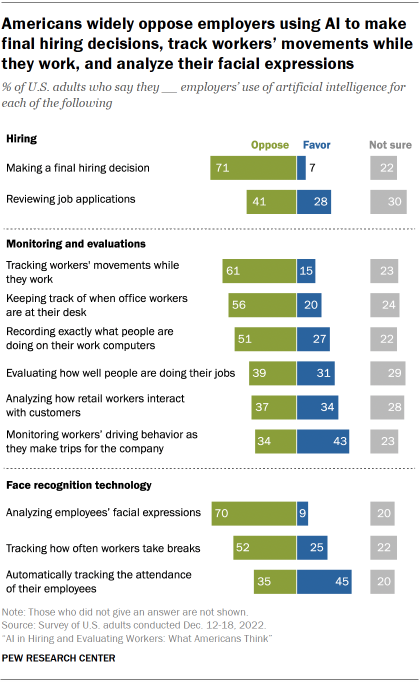
Americans have a range of views about the use of artificial intelligence systems by employers. They strongly oppose some possible applications of AI, but they also are more supportive of others.
They reject the idea that AI would be used in making final hiring decisions, by a ratio of roughly ten-to-one. A smaller plurality (41%) also opposes the use of AI in reviewing job applications. These findings line up with a theme in Center research: that people are not comfortable ceding final decision-making to a computer program.
Relatedly, U.S. adults are more opposed than favorable toward the idea of employers using AI analysis in determining other major employee-related decisions. By a 55%-14% margin, adults oppose the prospect that employers would use information collected and analyzed by AI about their workers’ job performance to decide whether someone should be fired from their job. And a 47% plurality opposes the notion that AI analysis of worker performance would be used in deciding if an employee gets promoted (22% favor this).
Beyond uses of AI in decision-making about hiring, firing and promoting workers, employers have access to AI systems that are able to track worker behavior – including when they are working remotely – and provide evaluations of their performance. U.S. adults oppose some key aspects of monitoring workers’ activities, but one application draws more support than opposition.
Americans are notably more likely to oppose than support employers using AI to track workers’ movements while they work, keep track of when office workers are at their desks, and record exactly what people are doing on their work computers. Views are mixed when the issue is the use of AI to evaluate how well people are doing their jobs: 39% oppose this use, 31% favor it and 29% are not sure. When it comes to organizations using AI to analyze how retail workers interact with customers, 37% oppose it, 34% favor it and 28% say they are not sure.
Still, there is an aspect of employer use of AI programs analyzing workers that draws more public support than opposition: By a 43%-34% margin, people favor employers using AI to monitor workers’ driving behavior as they make trips for the company.
When it comes to using face recognition technology to monitor workers, Americans – by 70% to 9% – oppose this as a way to analyze employees’ facial expressions. They are also more likely to oppose using face recognition to track how often workers take breaks (52%-25%). At the same time, a 45% plurality favors face recognition being used by employers to automatically track the attendance of their employees (35% oppose it).
It is important to note that as the public confronts these questions about uses of AI in hiring and monitoring workers, notable shares of the population say they are not sure of their positions.
About two-thirds of Americans say they would not want to apply for a job if AI were used to help make hiring decisions
At a personal level, many U.S. adults say they would not want to apply for a job with an employer that used AI to help make hiring decisions: 66% say they would not want to apply for a job under those circumstances, compared with 32% who say they would want to apply.
Across demographic groups, people are more likely to say they would not want to apply for a job where this technology is used than say they would. At the same time, there are some differences based on age, gender, race and ethnicity, and income. For example, 70% of women say they would not apply for a job with an employer that used AI in hiring decisions, compared with 61% of men who would not apply for a job at such a workplace.
Would you want to apply for a job that uses AI to help make hiring decisions?
% of U.S. adults who say they would or would not want to apply for a job with an employer that uses artificial intelligence to help in hiring decisions
66% say No
32% say Yes
In open-ended responses to this question,
people shared why they said “yes” or “no”
Note: Those who did not give an answer are not shown. For a full discussion of the coded open-end responses, please see Chapter 1.
Source: Survey of U.S. adults conducted Dec. 12-18, 2022.
“AI in Hiring and Evaluating Workers: What Americans Think”
Pew Research Center
Asked to describe in their own words the main reason why they would or would not want to apply for a job if AI is used to help with the hiring process, Americans cite a number of reasons. Some who would not want to apply to an organization that incorporates AI into hiring express concerns that the use of AI systems would remove the “personal touch” from the hiring process. Others say they worry that computers could not pick up on job applicants’ personalities or discern whether job seekers would fit in well with co-workers. Another fear is that AI systems can introduce bias or other problems into hiring processes.
Among those who would want to apply to an organization that uses AI in the hiring process, people cite potential positives. The views include the ideas that AI systems would evaluate job applicant skills more thoroughly and accurately than humans; that such systems would be more fair and objective; and that AI programs might save time in the hiring process. Some of those who would be willing to apply if AI were involved also say its use would not stop them from applying or does not matter to them. A full rundown of the data and themes sounded by respondents is covered in Chapter 1.
Public believes AI would be better than humans in treating applicants equally but would struggle with seeing potential in candidates
AI has been billed by advocates as a time-saving tool for screening applicants and a way to circumvent biases embedded in human decision-making. Still, critics argue AI-based recruitment tools could reinforce the very prejudices companies are trying to eliminate. At the same time, some warn AI could disadvantage nontraditional job candidates who may only meet some of the predetermined qualifications.
When asked if AI would fare better than humans at assessing applicants in four kinds of measurements, Americans have more confidence in AI to evaluate job seekers equally but are less convinced it could outperform humans in identifying qualified applicants or evaluating applicants in more nuanced and less quantifiable ways.
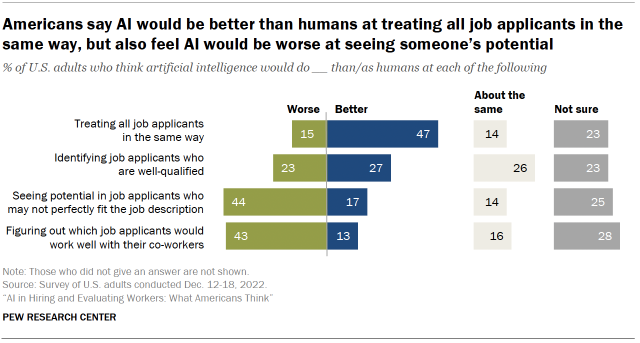
Roughly half (47%) say AI would be better than humans at treating all applicants similarly, while just 15% say it would do a worse job. By contrast, the public is more likely to believe AI would do worse than humans at seeing potential in job applicants who may not perfectly fit the description or at figuring out which applicants would work well with their co-workers. And views on identifying whether a candidate is well-qualified are decidedly more mixed, with somewhat similar shares saying AI would do better, worse or about the same as humans.
There is also a level of uncertainty on this topic, with about one-quarter saying they are not sure of the type of job AI would do for each of these tasks.
Can AI help combat racial and ethnic bias in hiring?
Americans widely believe racial discrimination in hiring is a problem, and for those holding this view, AI is seen as a promising way to address the issue.
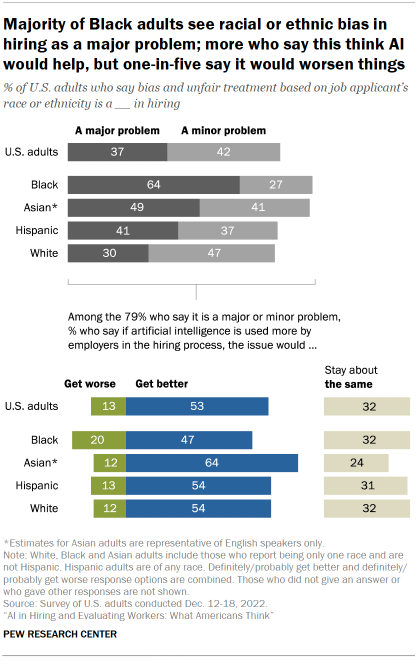
Roughly eight-in-ten (79%) say bias and unfair treatment based on an applicant’s race or ethnicity is a problem, but the degree to which they see this as an issue varies widely by race and ethnicity. While 64% of Black Americans describe racial bias in hiring as a major problem, that share drops to 30% among White adults. These sentiments among Asian or Hispanic Americans fall in between these two groups.1
Some companies have utilized AI to help increase racial and ethnic diversity in their workforce. Still, there are long-standing debates about whether AI eliminates or amplifies bias in hiring.
This survey finds the public taking the more optimistic view. Among those who say racial and ethnic bias in hiring is a problem, 53% think bias and unfair treatment based on race and ethnicity will improve with increased use of AI by employers in the hiring process, while much smaller shares (13%) believe AI will make the issue worse. About one-third say this problem would stay the same.
Across racial and ethnic groups, relatively large shares who view bias in hiring as a problem say this issue would improve rather than worsen with increased use of AI in hiring. Still, there is somewhat more skepticism among Black Americans than other racial or ethnic groups: 20% of Black adults who say racial bias in hiring is a problem believe AI being more widely used by employers would make the issue worse, compared with about one-in-ten Hispanic, Asian or White adults.
Similar patterns are present when asking about using AI to assess how people are faring on the job. Among those who see racial and ethnic bias in evaluating workers’ performance as a problem, more say workplaces relying more on AI for performance evaluations would better rather than worsen the situation. And while there is a belief across racial and ethnic groups that AI would be more helpful than detrimental in combating these biases in performance reviews, Black adults are again more likely than their counterparts to think AI would make the issue worse.
Surveillance, data mismanagement, misinterpretations are among potential outcomes the public foresees in AI-enabled workplaces
AI is not only utilized during hiring, it can also be used to evaluate and observe those already in the workplace. Companies increasingly rely on these systems to monitor everything from truck drivers’ movements to call center conversations.
When asked to evaluate possible impacts of using AI in this way, Americans see both benefits and downsides. But the potential negative consequences resonate most strongly with the public.
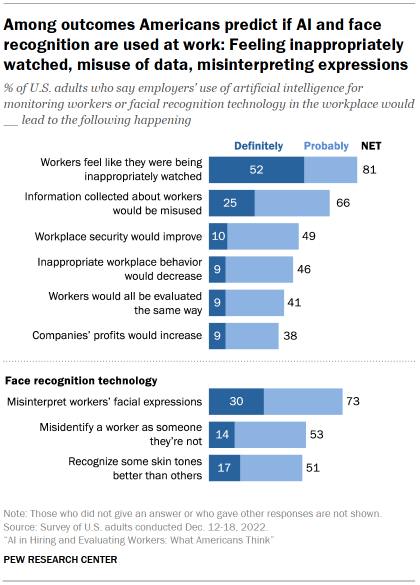
Indeed, there is consensus that employees would think Big Brother is watching: 81% of adults say this would lead to workers feeling inappropriately watched, including about half who say this sentiment would definitely be present. Concerns about data security are also common, with two-thirds saying information collected about workers’ performance would definitely or probably be misused if employers used AI.
By comparison, smaller shares believe this technology will be a plus for security and curtailing bad behavior. Some 49% say the use of AI in the workplace would lead to improvements in workplace security, while a somewhat similar share (46%) say the same for decreasing inappropriate workplace behavior. And about four-in-ten say jobs deploying AI would result in workers being evaluated in the same way and lead to companies turning a higher profit.
When it comes to assessing the impacts of a particular form of AI – face recognition – a majority of Americans (73%) say utilizing this technology in the workplace would lead to facial expressions being misinterpreted, while about half think it’s likely that face recognition systems would misidentify a worker as someone they’re not and that such programs would not recognize some skin tones as well as others.
Some views about AI use in the workplace differ by income, gender, race and ethnicity, age, and awareness of the topic
In addition to exploring how different groups view issues of workplace bias and discrimination in the context of AI use, the survey revealed other demographic and group differences on certain issues:
Income: Those with different household incomes at times have contrasting views about the use of AI in workplaces. For instance, Americans with upper incomes (38%) are more likely than those with middle (29%) or lower (20%) incomes to favor AI being used to review job applications. But adults with middle and upper household incomes are more likely than those with lower incomes to oppose employers using AI systems to decide whom to promote or fire. Nine-in-ten upper-income adults say workers would probably or definitely feel inappropriately surveilled if AI were used to collect and analyze information about how workers are doing their jobs, compared with 84% of those in middle-income households and 70% of those in lower-income families. A similar pattern plays out when the issue is the likelihood that data on workers collected and analyzed by AI would be misused.2
Gender: Men are more likely than women to see specific benefits and downsides to AI’s use in the workplace. For example, larger shares of men than women feel that if employers used AI to analyze information about how workers are doing their jobs, workers would feel like they were being inappropriately watched (85% vs. 77%). And men are more likely than women to believe that information collected about workers would be misused (72% vs. 60%). At the same time, men are more likely than women to think workplace security would be improved and company profits would go up with AI monitoring systems in place.
Beyond that, higher shares of men than women oppose certain uses of face recognition technology: analyzing workers’ facial expressions (74% vs. 68%); tracking how often workers take breaks (56% vs. 49%); and automatically tracking the attendance of employees (37% vs. 31%).
Race and ethnicity: Different racial and ethnic groups sometimes see applications of AI in hiring and workplace situations in diverse ways. For instance, White and Asian adults are more likely to see potential downsides for workers if AI were used to monitor them. They foresee workers feeling inappropriately watched or the information collected from this surveillance being misused. Smaller shares (albeit still majorities) of Hispanic adults and Black adults think these things would happen.
Asian adults stand out for their opposition to several types of AI monitoring in the workplace. Asian adults are also more likely than other racial or ethnic groups analyzed to oppose AI being used to track worker movements, desk time and computer habits. Conversely, Asian and Hispanic adults are more likely than their White or Black counterparts to see some potential benefits if AI were used in workplaces. Those benefits include improved security at workplaces and fewer inappropriate behaviors.
There are also differences by race and ethnicity when it comes to uses of face recognition covered in the survey. For instance, Black (25%) and Asian adults (23%) are more likely than White or Hispanic adults (16% each) to say face recognition technology definitely would recognize some skin tones better than others in a workplace setting.
Age: Opposition to various types of AI monitoring in the workplace varies across age groups. For instance, adults ages 18 to 29 are consistently more likely to oppose each of the six types of AI surveillance at work explored in this survey than those 65 and older. One of the striking gaps between these groups is on whether adults favor or oppose the use of AI to track what people are doing on their work computers: 64% of those ages 18 to 29 oppose it, compared with 38% of those 65 and older.
Adults under 50 are more likely to see AI systems as an improvement over humans in the consistent treatment of job applicants (50% vs. 43%). In the other direction, adults under 50 are also more likely to say AI would be worse at seeing the potential of job candidates (48% vs. 39%) or figuring out if an applicant would fit well with co-workers (46% vs. 39%).
Awareness about AI’s possible use in work-related activities is often tied to people’s opinions: Overall, majorities of American adults say they have heard nothing about the ways AI systems can be used in the hiring process or evaluating employees. About six-in-ten say they have heard nothing about AI use in the hiring process (61%) or about its use in collecting and analyzing information about how workers are doing their jobs (62%). Some 38% say they have heard nothing about employers’ use of facial recognition technology in the workplace.
These differences in awareness are associated with people’s answers in questions about these subjects. For instance, those who heard nothing at all about these uses of AI are more likely to say they are not sure of their views on some questions related to AI use in organizations in the hiring process or worker-monitoring systems.
By contrast, those who have heard a lot about the use of AI in hiring or in evaluating worker performance or the use of face recognition in workplace settings are more likely than others to think that AI will have a major impact on workers generally, on themselves personally and the U.S. economy. In addition, those who have heard a lot about some key uses of AI in workplaces are more open than those who have not heard anything to applying for a job where AI is used in the hiring process. And those more aware of AI use in workplaces are more likely to favor using these computer programs to review job applications.


